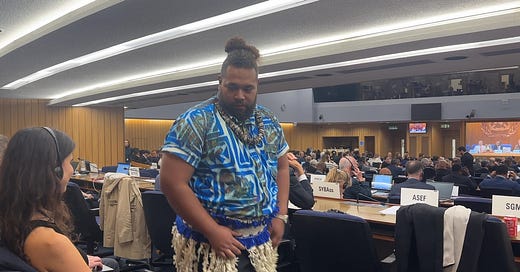Tristan Smith recently pointed out, in response to a Lloyd’s List editorial, that IMO negotiations are anything but boring. He stressed that:
They are a riveting mix of geopolitics and local politics, of hope and despair, of self-interest and empathy, of science and lobbying, of colourful captains and technocrats, and if you go on the right day - of dance, music and poetry.
One key intervention, by John Taukäve connects the latter three. Regular attendants of climate negotiations during Marine Environmental Protection Committee sessions will also recall the artistic interventions made by delegates of the United Kingdom and the Bahamas. Conveniently, their song and poetry are in English.
Understanding John Taukäve’s intervention takes language skills that hardly anyone in the room possesses, as he speaks in Rotuman, his mother tongue. This leaves us wondering what he actually tells us. To find out, I asked him to explain.
Since his first participation in IMO climate talks at MEPC79, John has ensured the observation of cultural protocols while creating Oceanic spaces of dialogue. During multiple MEPC sessions, he performed a Rotuman ‘Ki’ since MEPC80. When presenting this work at a recent conference, John summarised the meaning of the Ki as follows:
The Ki is a Rotuman war dance and war cry used to challenge opponents, a recognition of the relationship between the people and the Hanua, a call to change and an acknowledgement of the values instilled into the warriors being fierce and staunch in the buildup to battle.
Gifted by Rotuman elder and sub-chief, Gagaj Taimanav, this Ki chants of a warrior, Fä‘äfe, calling on his To’a (warriors) to regroup together for battle in chasing invaders out of the island.
Embracing its literal meaning, the chant metaphorically describes how ants would attack other ant colonies together as a core unit. It also highlights the values of battle instilled into the warriors, having their legs firm as posts strongly grounded on the volcanic black rock, holding their opponent’s thighs and tripping him over.
I linked the importance of the Ki to the united efforts of the 6PAC+ at the IMO recognizing the constant battles in negotiations in the spirit of compromise, the spaces they provided for oceanic dialogue within and outside negotiations and reinstating our view of the ocean, maritime trade and climate change.
The spirit of the Ki’s challenge is not lost.
Fä‘äfe:
‘op ‘opom - ‘op ko farua!
Hi-tua (3x)
Fa:
hi (3x)
Fä‘äfe:
TO’A
Fa:
aaaa - eeee
Fä‘äfe:
tuitui - e ma Rau’ata e
Figalelei ma na ta vạl hiti’ he
Fa:
eeee - aaaa – eeee
All:
tu - i tu - i
toko ‘e muri
Ra - u - ata
fu vakavaka
Ne - ne - ‘ạki
fu tauna’i
Vata - vata
Säe ne Vaka
Fä‘äfe:
TO’A
Fa:
aaaa – eeee
Fä‘äfe:
Hi - tua (3x)
Fa:
Hi (3x)
Fä‘äfe:
TO’A
Fa:
aaaa - eeee
All:
tuturu ‘e pou
Fu’ạki la mou
‘Uhapa sasaga
‘Avia on saga
Sasap se ‘on la
Tamatei’akia
Motara la pa
‘e Papatoa
Fä‘äfe:
Tamatei Tamatei Tamatei
Fa:
eeee - aaaa – eeee
Fä‘äfe:
Hi - tua (3x)
Fa:
Hi (3x)
When John performed the KI at the IMO, he did so in the belief that by activating body and voice in unison, the Secretariat would be challenged to take SIDs and LDCs more seriously? And in taking heed of the challenge, would the IMO empower everyone in the room to be more connected to each other both personally and as a global community?
Vilsoni Hereniko, a Rotuman scholar and artist, explains the feeling of the vā being activated as John did in London. By performing, the spirit of the community is reinvigorated and restored. John notes that:
I felt this as I finished the Ki and paused for a good 5 seconds looking directly at the chair. At this experience, the space between myself and everyone else was a numb feeling. It felt as if my ancestors possessed my body and took over but I was aware of what my body was doing. A moment of transcendence, finding my inner peace. The standing ovation response from the audience, especially from my Oceanic colleagues reaffirmed to me how impactful and relatable the Ki was reminding them of who they were and why they were there.
—
Meanwhile, John Taukäve started his PhD at the University of Amsterdam, where he reflects on this first-hand experiences in Ocean Diplomacy, through the project Oceanic Imaginaries, Oceanic Solidarities, with his supervisors Mikki Stelder and Laura Cull. Find him on LinkedIn, Instagram, and Facebook.




